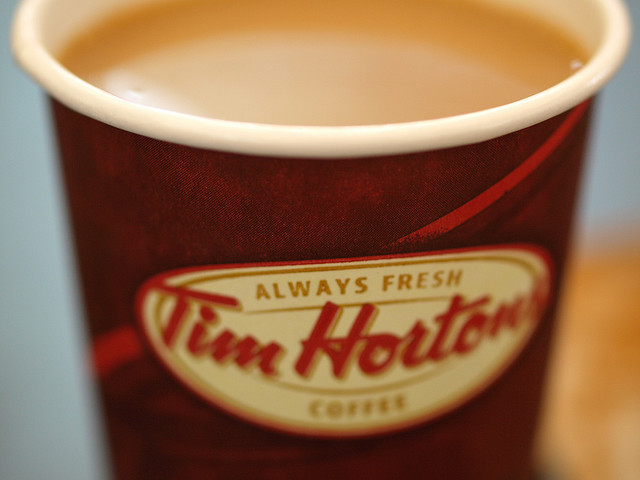As we saw with Tim Hudak’s Million Jobs fantasy, claims about the benefits of corporate tax cuts can sometimes stretch into the realm of hallucination.
We’ve now reached a new level of silliness in public discourse about taxes with the suggestion by Finance Minister Joe Oliver that Burger King’s $11-billion takeover of Tim Hortons somehow illustrates the benefits of Canada’s low corporate tax rates.
One might be left with the impression that the corporate creator of the Whopper plans to invest a whopping $11 billion in Canada. There’s a whopper for you, but it’s not inside a bun.
The truth is that the Burger King-Tim Hortons deal is just a paper transaction that, apart from enriching some stockholders, will likely provide zero benefit for Canada, in terms of job creation or additional revenue for the public purse.
Of course, we can look forward to multi-billion-dollar Burger King moving its head office to Canada — or more likely we can look forward to Burger King opening up a post office box here. Its operational headquarters — where decisions are actually made and people gainfully employed — will remain in Miami.
So it’s been to encourage this sort of “investment” that the Harper government has been slashing corporate taxes, leaving Ottawa now collecting about $13 billion less per year than when it came to office. That’s $13 billion less that Canada has each year to spend on public health care, education, transit, etc.
Burger King is clearly trying to take advantage of a popular U.S. tax scheme known as “tax inversion,” whereby a corporation takes over a foreign company to get around U.S. tax laws requiring corporations to pay tax on their worldwide incomes. Canada doesn’t have such a requirement, making it easier for companies headquartered here to avoid taxes through “transfer pricing” — that is, shifting profits to offshore tax havens.
The Obama administration has been trying hard to clamp down on this “unpatriotic” tax inversion scheme, whereby some of America’s wealthiest corporations have managed to dodge billions of dollars in taxes.
But this raises the interesting question of how Canada should react. We’re always told we should try to lure corporations here with low taxes.
But such a strategy — even if it did result in some benefit to Canada — is ultimately self-defeating.
The lower we cut our tax rates, the more other countries feel obliged to cut theirs, and round and round it goes, with less and less revenue for vital public programs everywhere. In this race to the bottom, only the corporations win.
Instead, we should be supporting the Obama administration in its efforts to stop international corporate tax dodging.
The White House is currently locked in a fierce battle with powerful corporations over the tax inversion schemes and also over the U.S. corporate tax rate, which at 35 per cent, is one of the highest in the world. Corporations want it slashed.
The outcome of this Washington showdown will affect us all. If the multinationals succeed in coercing the mighty U.S. government to cut its corporate tax rate, it will be much harder for less powerful countries to resist the corporate tax-cutting juggernaut.
The race to the bottom will be on in earnest, with the corporate world happily handing out steroids.
The only way to counter international corporate tax dodging is for countries to co-operate with each other. Organizations like the OECD could be used to establish an international system for allocating the profits of multinationals, based on their actual sales and operations in each country.
At the very least, Canada’s tax system should not encourage multinationals to escape the legitimate reach of U.S. tax authorities.
Along with reviving the race to the bottom, the Burger King takeover has also given fresh legs to the curious notion that Tim Hortons is some sort of Canadian national icon, that it is, according to Globe columnist Joe Friesen “enmeshed in the very idea of Canadianness.”
This sort of nonsense about Tim Hortons as a treasured national institution has been actively encouraged by conservatives — particularly the Harperites.
What better way to redefine Canada as nothing but a marketplace than by suggesting there aren’t any meaningful Canadian institutions — only places to buy things.
As business commentator Rudyard Griffiths wrote in the Toronto Star shortly after the Harper government was first elected: “The country’s most cherished myths seem to be melting away…If we are not what we were, what now defines us as a nation?…what new national touchstones do we want to forge together to replace, say, universal health care or peacekeeping?”
Well, there’s always time for Tim Hortons.
In the new conservative age, we’re encouraged to forget about universal health care and peacekeeping and instead derive our national identity from a fast food chain that pays low wages, dodges corporate taxes and provides space for Canadians to come together — in order to line up to buy coffee, often without even getting out of their cars.
Winner of a National Newspaper Award, Linda McQuaig has been a reporter for the Globe and Mail, a columnist for the National Post and the Toronto Star. She was the New Democrat candidate in Toronto Centre in 2013. She is the author of seven controversial best-sellers, including Shooting the Hippo: Death by Deficit and other Canadian Myths and It’s the Crude, Dude: War, Big Oil and the Fight for the Planet. Her most recent book (co-written with Neil Brooks) is The Trouble with Billionaires: How the Super-Rich Hijacked the World, and How We Can Take It Back.
This article is reprinted with permission from iPolitics ![]()
Photo: Alan C./flickr



